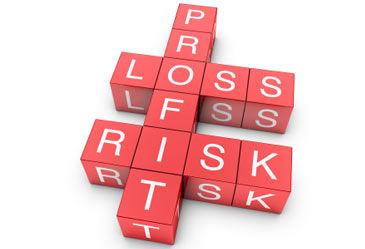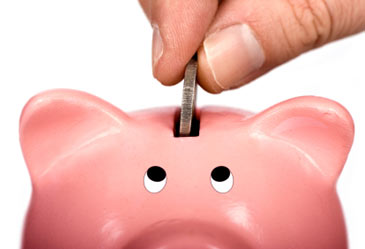(Excerpted from "The Rules of Money" by Richard Templar)

You've Got to Know Where You Are Before You Start
Before we can go forward, we have to know where we are now. Or rather, you have to. When Robinson Crusoe swam ashore from his shipwrecked boat, the first thing he did was check out what supplies, guns, and ammunition he had. Once he knew that, he could assess the situation and move forward.
So you are going to swim ashore and begin your new life. The first thing you have to do is to take stock. Find out what you've already got, what can be used, what can be discarded or discounted, what you owe, what you are owed, and what basically is your net worth.
We're going to do a full financial audit on you and your life. If you don't know where you are before you start, you can't really work efficiently toward becoming wealthy. It's a wise man who lays out his tools before he begins the job.
All you've got to do is collect all the information -- what you owe at the bank (or have in there in your current account, deposit account, savings account), and what you owe on credit cards. Also start working out what you spend on a monthly and annual basis (and where you spend it).

You've Got to Have a Plan
Why are a fool and his money so easily parted? Because the fool doesn't have a plan. If you don't have a plan, you'll be tempted to fritter your cash away, spend it instead of investing, or forget the new business idea or career move. If you have a plan, you know exactly what does and what doesn't fit into it.
First things first. If you have a job you love and are happy, then you'll probably want to stick with it. If it doesn't make you enough money, you need a plan to generate income another way. If your job is making you miserable and, what's worse, keeping you in a poverty trap, you must prioritize getting out of it in your plan.
Your plan should involve taking financial control of your life. If you have debts, it will definitely include tackling these as a priority. Ditto about spending excesses. The plan might involve a career change, investigating a business idea, investing money, or generating some capital so that you can enter the market. It may well include selling things. A lot of money is generated through selling things -- whether it's a product, a service, or your time and skill. That's why I like writing books -- even while I sleep, there is a bookshop somewhere that is selling books for me. In fact, one of the fundamental truths about getting rich is that wealth -- real wealth -- comes from doing deals, not from earning wages, salaries, or fees.

Get Your Finances Under Control
You may well have enough money, but it leaks away before you get to spend it, in a whole variety of ways -- taxation, paying interest, lack of use (not invested properly), or too much being spent on the wrong things. Before you can control your finances, you have to stop the leaks.
If you carried out this role (of course, you did), you'll have a record of your credit card balances. Higher than you cared to admit? Probably. We are all encouraged to spend on plastic. We are all seduced into racking up debts monthly. If you want to stop the leaks, cut up all the cards and pay them off.
Do a quick calculation and see what levels of interest you are paying. It's the same with your mortgage. Make sure you're not paying more than you have to through negligence. If your fixed rate deal has come to an end, it could be time to check out the best deals that are now available.
Keep a record of everything you spend. Everything. Do this for a short while -- even just a week -- and see where the leakages are. If you are going to be wealthy, first you have to know where your money is going. Sorry if you thought this was going to be easy or this book was going to be full of get-rich-quick schemes. But stick with me, and you'll be glad you did.
When you carry out your financial stock -- check, watch out for the hidden things that you can easily overlook, such as direct debits and subscriptions that are too high, wrong, or out of date. The rich are eagle-eyed and miss nothing.

Decide Your Attitude Toward Risk
After you decide your attitude toward risk, it makes your planning easier. It allows you to tailor how you intend to become prosperous. Hare or tortoise, I guess.
Obviously, your attitude will vary depending on the project. Things to take into consideration are
- Your age -- We cope better with risk the younger we are.
- Family commitments -- If, like me, you have young children, it does make you more cautious. If they've all left home, you might be prepared to push it a bit further.
- Income and/or assets -- You need to work out the percentage of your wealth you are prepared to risk. The more you've got, the smaller the risk might be -- unless you are prepared to lose the ranch, of course.
If you are going to take risks, then do try to offset them. Take out insurance if you like:
- Don't put all your eggs in one basket (more about this later).
- Consider how much stress and excitement you can handle.
- Look at the timing -- long term against quick returns.
- Think about how much you can afford to risk -- worst-case scenario stuff.
- How much information do you have? Too little increases risk.
The other thing to ponder is how you respond to the risks of life. Life in itself is risky, and nothing is certain. How do you cope when things go wrong? Are you positive, dynamic, enthusiastic, and up? Or do you get all gloomy and depressed and feel the glass is half empty? Know yourself, and know how you cope and how you respond to changes. And remember that risk doesn't mean bad. It means you don't know how it will all turn out.

You Have to Work Hard to Get Rich Enough Not to Have to Work Hard
I cannot emphasis how strongly I feel about this one. I watch and learn from the seriously wealthy and have reached the conclusion that in nearly every case, they worked like crazy to get where they are. They often started early. They worked late into the night. They sacrificed a lot. They didn't take long lunch breaks. They didn't waste time. They didn't watch television in the evenings. They worked their socks off. They knew money doesn't grow on trees.
Let me make one very important point here. This Rule does NOT mean that if you work hard at anything, you will become wealthy. An office cleaner on minimum wage will not become rich by working all hours as an office cleaner or by cleaning really hard and thoroughly. He might, however, become rich by starting his own cleaning company, working very hard at getting it off the ground and finding new clients, and making sure his staff is great, happy, and motivated.
What I'm saying here is that even if you've got a great business idea or have some money to invest in shares, you will only maximize your return if you work really hard at your idea or invest the money wisely and manage it carefully. You have to put the effort in before you can reap the dividends.

Learn the Art of Negotiating
The art of negotiating will stand you in good stead in so many different situations -- from negotiating a simple pay rise to negotiating in your relationship with your partner to negotiating with your kids over pocket money. If you learn this art, everything will move along easily and smoothly, and you will get what you want -- and they will get what they want, too. Win/win.
There are a number of rules about negotiating that you need to keep in mind:
- Always know your bottom line -- the point beyond which you will not go.
- Always know what it is you want -- the goal, the end product, the target. There's no use negotiating if you don't know what you are negotiating for.
- Always aim for win/win.
- Always remember that negotiating isn't just about stuff -- it has powerful emotional ramifications as well.
- Know the importance of each point -- some you can let go of, some you can't.
- Always be prepared to give up things to secure other things -- be flexible and fluid.
- Always know as much as possible before you start -- knowledge is power in these situations.
- Understand what people aren't saying as much as what they are saying -- watch their body language and facial expressions.
- Stay cool and patient.
- Negotiate successfully for everything you want at the beginning -- you can't negotiate afterward. No one will go back over a contract you've signed when you realize you don't like it.
- Find out exactly what others want (what they'll trade or concede), and get all their shopping list before you start negotiating. Hide yours.
- Don't make concessions -- trade them.
- Create more variables -- discounts, delivery, payments, stages, and so on.
- Go for the best deal you can possibly justify. Coming down later is easy; going up later is almost impossible.

Understand That Working for Others Won't Necessarily Make You Rich -- But it Might
Most of us assume that we'll never make it to greater prosperity while we are working for someone else -- that only by being entrepreneurial will we become wealthy. And for a lot of us this may well be true -- there is a limit as to how much you can earn per hour in return for your labor. However, there are some who do make it good this way.
We shouldn't overlook the fact that being employed may be the best route for us and that we don't have to run our own business. There are whole categories of employees who are doing quite nicely, thank you -- for example, a friend of mine works in corporate insurance, and he's extremely wealthy thanks to large commission payments. He says he wouldn't be any better off working for himself.
Many people working in the computer business opted to become contractors because they assumed they would earn a lot more. Some did, but at the cost of stability. When the contracts dried up, some were worse off than when they were employed. But for some, this was indeed the best way to go, and they have made handsome sums by becoming self-employed.
I guess you have to keep an open mind about this one and not be driven by assumptions. You can make yourself quite unhappy by forcing yourself into self-employment if this isn't the right way for you. Perhaps the stability of employment is a greater priority, and you should stick with it and not feel compelled to start your own business.

Spend Less Than You Earn
I'm amazed how many people flout this simple but most golden of all golden rules. You have to live within your means. Control your spending. Allow yourself to create a little bit of savings, with which to generate more income. (Remember the rabbit farm? You can't breed more rabbits if you sell them all.)
This is about being informed and in control. You need to know what your income is and what your expenses are. We'll talk later about how to curb spending and make savings and how to cut up your credit cards if they've let you down--they do that sometimes, evil little things.
You also need to know
- Any expenditure that is likely to come up
- Any provision you've made for contingency plans
- Any future income you may be entitled to in the way of interest or investments coming to fruition
And that really is about it. Where people go wrong is not whether they earn enough or spend too much -- both of those are fairly easy to overcome. No, the biggest mistake is not knowing what you are doing, where you are financially, and what is up ahead.

Pay Off Your Loans and Debts as a Priority
Do you clear your credit card balance every month? If you do, and you don't have any other outstanding loans/debts, then well done, you. You're not wasting money paying interest, and you're already in a strong position to go forward. Skip the rest of this Rule and carry on.
If you do have a credit card balance (or five), an overdraft, or other loans or debts, then you certainly aren't alone. It's so easy to get credit these days, and we live in a "have it now, pay later" society. Trouble is, debt bogs us down and holds us back. We're simply throwing money away paying off the interest. (You borrow, say, $20,000, and you can end up paying several thousand extra dollars back in interest. The actual amount you end up paying depends on how long you borrow for, as well as the interest rate you're being charged.) Debt is a millstone around the neck -- it makes you feel bad, it's always there nagging away at the back of your mind, and it can easily become a major problem that affects your health as well as your wealth.
There's no doubt about it. The very first thing you need to do on your wealth quest is to get loans/debts paid off as soon as possible and do nothing else until that's done. There's no point at all starting to put money into a savings account, earning say 5 percent interest, if you are at the same time paying 10 percent interest on money you owe to the bank or somebody else. It doesn't make sense. The simple truth is that those who borrow almost always pay a higher rate of interest than the rate received by those who save.

Don't Rent, Buy
We all need somewhere to live. We, therefore, have the choice as to whether to rent the roof over our head or buy it. Most of us can't afford to buy outright (I doubt you'd be reading this book if you were in this category), so to buy, we need to borrow a lump sum of money to buy with. But hang on. Haven't we said that borrowing is bad, bad, bad, and we shouldn't do it? Haven't we said that this way madness lies, because you pay so much interest on what you borrow and so on? Indeed we have.
So how can you own and not borrow, buy and not have a mortgage?
The answer is that a mortgage can actually be viewed as an investment rather than a borrowing. If you buy a property with a mortgage, you make a monthly investment. The fact you pay that to a mortgage company we can gloss over. You see, in the longer term (and if you're lucky, the shorter term, too), you can reasonably expect that the interest you pay on your mortgage will be less than the increase in the value of your property. What you are banking on is that the value of your home will, in the longer term, go up and, therefore, you have invested whatever deposit you put down and your mortgage money.
Renting, on the other hand, is not an investment. You will never see that money again. Of that there is no doubt.
With a mortgage, you stand a good chance in the long term of seeing your mortgage payments lead to an increase in the value of your house. When you sell, you get that increase in value.
There are those who believe that buying your home instead of renting brings with it huge stresses and means you have less fun. It's actually not the ownership that causes stress, it's how much you borrow to do it and what that means for your overall financial picture. The lesson is to think carefully about how much your mortgage repayments will be and that you are able and willing to pay them.

Build a Bit of Capital; Then Invest it Wisely
Lots of people don't get prosperous because, as we saw earlier, they are too lazy. But a lot fail because they don't know what to do when they start to earn some money. It's easy to think, after you've got your hands on a bit, that you have earned it, you deserve it, you're gong to spend it. You have earned it -- assuming you haven't robbed anyone to get it -- and, yes, you probably do deserve it. But no, don't spend it all now, no matter how much you want that new car, holiday, cottage by the sea, whatever.
I've done it. I guess we all have. I once got a massive tax rebate. I don't remember why I was being taxed so highly, but I was for several years, and when they repaid me, it was quite a handsome sum. And, of course, I blew it, on a spendid holiday. But that's the difference between the rich and the not so well-off. The rich see a sudden windfall like that as an opportunity to make some more money out of it. The not so well-off remain not so well-off because they see it as an opportunity to have some fun. Nothing wrong with that if that's what you want in life -- instant pleasure. But if you want greater wealth and pleasure (albeit delayed), then you must learn as I did that when you get your hands on a lump sum, or build some up, you must immediately put it to good use. And, frankly, the only good use is as a starter kit for prosperity.
And it isn't lost, merely put to one side to work for you. After it has grown and attracted lots more lovely money, you can have all the holidays you want. But you have to wait, and you have to use that starter kit well and wisely. Guides who make their living from tips find it wise to put something in the tip plate first. You have to put a coin or two in the plate or no one else will tip.
Street musicians do the same thing, put a coin or two into the hat to get the crowd going. No one will put anything into an empty hat. What you are going to do is load your prosperity hat.

Think Long Term
If you expect a rapid and sudden catapult into prosperity, go play the lottery and good luck to you. (You'll need it.) Gaining wealth is a slow process, and rightly so. If you get it all quickly, you have no time to acquire experience and sense. Too quickly, and it'll be all "spend, spend, spend."
Thinking long term is a bit like thinking in very fast motion while the rest of the world moves incredibly slowly around you. Easy does it, as they say. Ever tried to swat a fly? A fly's eyes are different from ours and they basically see in fast forward. By the time you raise your hand, they have already predicted the movement and flown away. You have to develop the same ability. You have to see what's happening before it happens, and the only way to do that is to think long term.
Think of gaining prosperity as stalking a reluctant tiger. It'll be wary and cautious, and you have to stalk it skillfully, quietly, almost lovingly. It's no use running up and shouting at it -- it will either turn round and kill you or run off. Better to take your time and creep up slowly and quietly. Any sudden movements will startle the canny beast.

Create New Income Streams
When it comes to wealth-creation strategies, investing wisely and managing your money actively are important, but nothing beats having more coming in the first place. Everybody benefits from some thought about where his income comes from and how he could create another source of revenue.
It's a bit like being a street musician and having good spots to play at. If one is proving unprofitable, you can pack it in and go somewhere else. But instead of packing it in, what you are going to do is duplicate yourself -- a cloned you, if you like -- and not only carry on playing on one street but also be playing in a new place at the same time. The more hats you have out, the more they are likely to return a profit.
Look, don't take my word for this. Check it out yourself. Look at any prosperous person you admire, and see if diversity isn't his tool for unlocking greater prosperity. The rich usually have several money-making schemes going for them.
This is especially important for anybody who loves his work but isn't paid well. What you need is another income stream.
There are a couple of ways of doing this. The first is to turn surplus cash into assets that will work for you and bring in income, even when you aren't there. Rent from a rental property would be one example, or annual dividends from shares you've bought. The other way to create new income streams is to find ways of using your skills and expertise in more than one setting, so you aren't just swapping your labor for a paycheck in your day job.
This doesn't mean packing in your day job necessarily. It might mean, for example, doing some freelance work, either in the same area or a completely unrelated area where you also have skills and expertise. (Maybe you have a hobby, which means you have other skills and expertise that could be used?) Is there anything you could teach or consult on or that you could set up as a business?

Control Spending Impulses
The surest way to defeat your wealth creation is to go out and spend everything you earn or receive (and a bit more just for good measure). This particular addiction is very strong in me. I blame it all on giving up smoking. I have nothing to do now with my hands, so fiddling with a credit card seems to satisfy some deeply buried addictive urge. But you have to resist if you are going to turn what little you have into a bigger something. Forget notions of new cars and holidays in the sun. You are going to turn into a bit of a Scrooge for a while, hanging on to what you've got to prepare for the future when you will have so much more. This means you have to control your urges.
Look, I'm going to let you into a secret. Prosperity is a race, a prize, a winning line. We all set out wanting to race toward it, claim it. Some can't be bothered to even make it to the starting line because they are so weighed down with unhelpful beliefs that floor them before they start. And a whole lot of people fall by the wayside from laziness early on. A whole lot more fail to make the grade because they get daunted by the hard work needed. Still more, at this point, where you are now, stumble because they give into temptation and spend, spend, spend like there is no tomorrow.
Well, there is a tomorrow, and it comes quickly enough. And that shiny new car now looks sad and rusty, the holiday is gone with only a few photos of people and places you can't even remember, and the new clothes are outgrown and unworn.
The simple truth is that the rich know how to control their spending urges--that's why they're rich. When they need to tighten their belts, they can do it.



